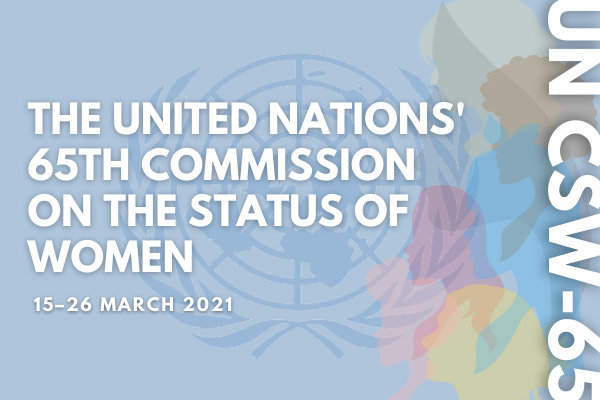CCA’s delegation to attend 65th session of UN’s Commission on the Status of Women

An eight-member delegation representing the Christian Conference of Asia (CCA) has been accredited to attend the sixty-fifth session of the United Nations’ Commission on the Status of Women (UN-CSW), which will take place from 15 to 26 March 2021.
The CSW, a functional commission of the United Nations Economic and Social Council (ECOSOC), is a global policy-making body dedicated exclusively to promoting gender equality and the empowerment of women.
In view of the ongoing constraints due to the COVID-19 pandemic, and taking into account the latest guidance from the UN and the World Health Organization (WHO), the CSW-65 will take place in a hybrid format with mostly virtual meetings and/or proceeding with a portion of work through correspondence.
Representatives of Member States, UN entities, and ECOSOC-accredited non-governmental organizations (NGOs) from all regions of the world are invited to attend the CSW sessions.
The CCA has been accredited with the UN-ECOSOC since 2003. This special consultative status enables the CCA to facilitate the advocacy of Asian Churches in various areas of their concerns through different UN platforms at the global level as well as at the Asia regional level.
The priority theme of CSW-65 (2021) is “Women's full and effective participation and decision-making in public life, as well as the elimination of violence, for achieving gender equality and the empowerment of all women and girls”, while the review theme will focus on “Women’s empowerment and the link to sustainable development”.
Dr Mathews George Chunakara, General Secretary of CCA, expressed the hope that the participation of CCA representatives at the CSW-65 (2021) will be a unique opportunity to learn more about several pertinent issues and emerging concerns that will be discussed and analysed at the CSW sessions.
The CCA General Secretary has further added that the members of the delegation will have opportunities to listen to and review a number of reports prepared by UN Women, including a report on the priority theme and a report on progress made on the review theme at the national level as well as statements submitted by NGOs. The process is expected to be quite effective thanks to the improved technology available for virtual working all the time.
The CCA delegation to CSW-65 includes Rev. Kyrie Kim, Chairperson of the CCA’s Programme Committee from the Anglican Church in Korea; Prof. Dr Susan Thomas, Malankara Jacobite Syrian Orthodox Church; Rev. Astrid Bonik Lusi, Christian Evangelical Church Timor in Indonesia; Rev. Moumita Biswas, Church of North India; and Ms Nandita Biswas, National Council of Churches in Bangladesh and CCA staff members Ms Sunila Ammar, Ms Rosiana Indah Purnomo, and Ms Ruth Mathen.
Considering the CCA’s thematic interests, the delegation will take part in several virtual sessions including official meetings and side events organised by permanent missions of different countries at UN, UN bodies, international organisations, and civil society organisations.
The meetings and sessions that will be attended by the CCA delegation include: Eliminating violence against women in public life; Building back better—women’s participation and leadership in COVID-19 response and recovery; Women’s empowerment and the link to sustainable development; Reclaiming gender justice; Migrant women’s participation in public life and decision-making; Economic empowerment of women for COVID-19 recovery; and Gender, religion, and decision-making in public life.
The Commission consists of 45 members who are elected for a period of four years by ECOSOC on the basis of equitable geographical distribution. Eleven members are from Asia-Pacific States.










